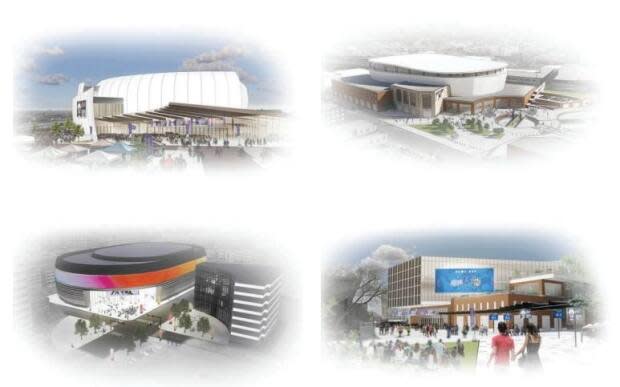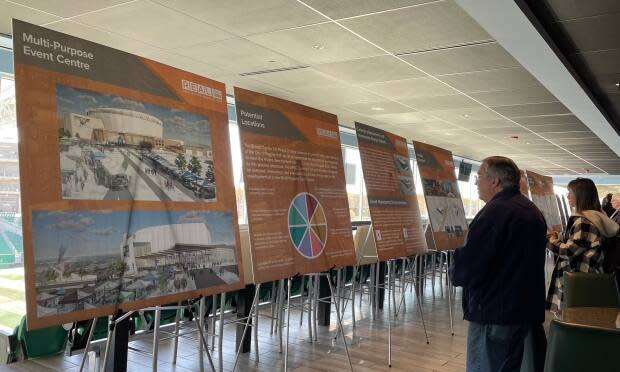How might Regina and Saskatoon pay for new downtown arenas?

Plans to construct new arenas in Saskatchewan's two largest cities bring up a familiar question: who is going to pick up the cheque?
Regina and Saskatchewan are planning to build entertainment districts in their respective downtown cores, with an indoor arena as the central feature in each.
While construction has not yet begun, discussions on potential fiscal solutions are already happening.
Saskatchewan's Minister of Government Relations Don McMorris confirmed in an interview that he has already had discussions with Saskatoon Mayor Charlie Clark and Regina Mayor Sandra Masters about the potential projects.
"There certainly hasn't been any ask of the provincial government yet. They just want us to know that the initial planning has started," McMorris said.
LISTEN| Will an arena/event centre be the key to revitalizing our downtowns in Regina and Saskatoon?
Where the cities stand
Planning for these projects is already well under way.
Regina city council has endorsed a recommendation that it build a new arena somewhere in the city's "greater downtown" to serve as a replacement for the Brandt Centre.

An initial estimate for the minimum cost of the new arena is $156 million. However, a report found that if the project is built more than a decade from now, the cost could increase by 80 per cent due to inflation.
Saskatoon has spent $42 million purchasing multiple properties near the Midtown shopping centre, where the city envisions a new entertainment district will be located.
Estimates on the potential cost of construction are not available, although the city has said a funding strategy would be in place by the summer.

Saskatoon also recently issued a tender for a negotiation advisor as it works secure a private business that would operate the entertainment district.
Any more details on potential negotiations are contained in documents that would require CBC to sign a non-disclosure agreement.
Where will funding coming from?
When funding is discussed, all answers point in one direction: cities can not do this alone. The municipal, provincial and federal governments — and potentially private entities — would need to open their wallets to help get these projects across the line.
"I think it's fair to say that a facility in either Regina or Saskatoon wouldn't get built unless there was, you know, the three levels of government involved at some level," said McMorris.
Regina's catalyst report made it clear that mega-projects need multiple funding sources. The City of Saskatoon has indicated it's seeking a private partner to help fund its arena.
An economist who specializes in the economics of sports and arenas says says a downtown arena in a small city will likely not be lucrative enough to be solely funded through a private investor.
Regina and Saskatoon are sandwiched between the bigger markets of Calgary and Winnipeg, and the new arenas wouldn't be big enough to lure massive acts, said Victor Matheson, an economist at College of the Holy Cross in Massachusetts.
Matheson said cities can build projects that are not designed to make money as long as everyone is clear about that going in.
"There's lots of public parks out there that don't generate you dollars and cents, but you still might want to have them because it's an amenity for the local population," he said.
LISTEN| Regina restaurant owner hopes her building is not demolished for downtown arena
Each community will need public buy in for the projects to succeed, especially if they are reliant on dollars from multiple levels of government.
"This really is a community decision about, is this where you want to put your money," Matheson said.
Cost-splitting
McMorris highlighted that the province is not in the position to be the only government lending a hand on these arenas.
"We're waiting on the federal government to come through with another infrastructure program so that all three levels of government can share in the cost," he said.
McMorris repeatedly said he would like to see the federal government offer another program similar to the Investing in Canada Infrastructure Program (ICIP), which sees the cost of a piece of infrastructure be split between the three levels of government.
He stressed that any new program should come with fewer strings attached to allow municipalities to address their needs rather than prioritize what the federal government wants.
Regina was able to get permission from the federal government to apply for ICIP funding that was originally meant for transit infrastructure, but now has the potential to fund green infrastructure projects. The City of Regina's application to use $128 million to help cover the costs of a new $189.2 million aquatic centre and geothermal heating facility has yet to be ruled on.
On Wednesday, Regina's mayor said she has raised the topic of funding streams with the provincial and federal governments, as well as organizations like the Saskatchewan Urban Municipalities Association
"[We want] flexibility in terms of depending upon the need that's been identified by each individual municipality," Masters said.
Matheson said it's not likely that the province will choose one project over the other, especially if the arenas get off the ground at the same time.
"Quite honestly, I think you're much more likely to get two new facilities in Saskatchewan if they both come on on the same time, rather than if they try to do these, you know, five or 10 years apart."


